12 Hour Night Shift Meal Plan: Why Everything You’ve Been Told About Eating at Work Is Wrong

I remember my first week of night shifts – I’d pack what I thought were “healthy” meals, only to find myself face-first in a bag of chips at 3 AM, wondering why I had zero willpower. Turns out, it wasn’t about willpower at all.
If you’re one of the millions of people working nights, you’re eating when your metabolism is programmed to shut down, creating challenges that standard nutrition advice simply can’t address. If you’ve been struggling with energy crashes, weight gain, or digestive issues during your shifts, the problem isn’t your willpower—it’s that you’re following daytime eating rules for a nighttime schedule.
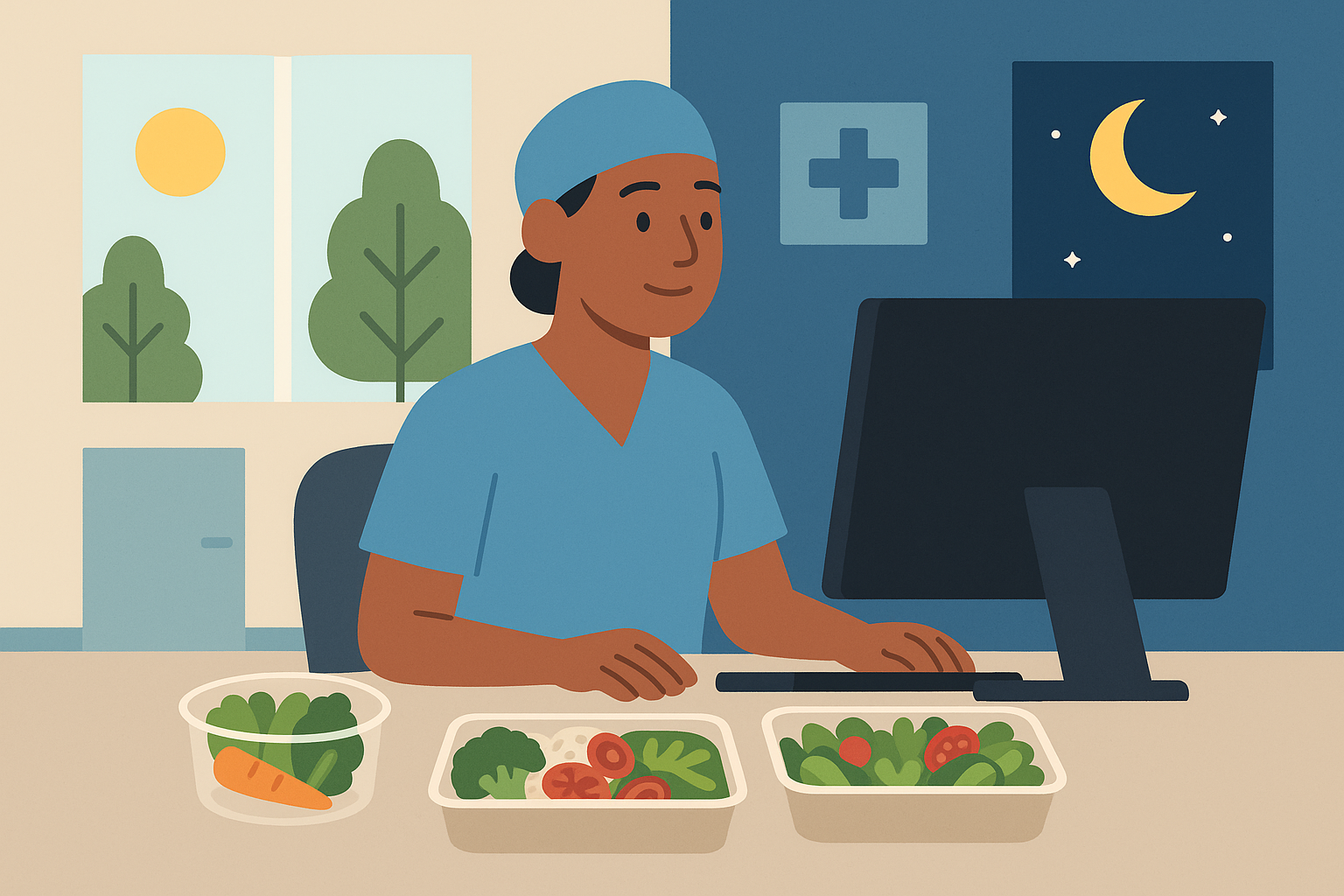
Understanding how to properly fuel your body during night shifts is as crucial as knowing how to approach intermittent fasting during unconventional hours.
Table of Contents
- Your Body’s Betrayal: When Biology Works Against Your Schedule
- The Weight Loss Trap Most Night Workers Fall Into
- Timing Your Fuel: The Anti-Inflammatory Game Changer
- Recovery Mode: The Missing Piece Everyone Ignores
- Final Thoughts
TL;DR
- Look, your body literally becomes more diabetic at night, making traditional carb-heavy meals during shifts a recipe for disaster
- Weight gain isn’t just about calories – your confused hunger hormones create cravings that sabotage even the best intentions
- Foods that fight inflammation, timed right, can combat the chronic stress night shift work creates
- What you eat AFTER your shift determines how well you recover and adapt, yet most meal plans completely ignore this critical window
- Spreading protein every 3-4 hours becomes essential when your natural growth hormone cycles are completely messed up
Your Body’s Betrayal: When Biology Works Against Your Schedule
Working nights forces you to eat when your metabolism is programmed to shut down, creating challenges that standard nutrition advice can’t touch. Understanding how your internal clock affects insulin sensitivity, digestive enzymes, and nutrient processing helps explain why you might struggle with energy crashes, weight gain, and digestive issues during shifts.
Scientists recently discovered something pretty eye-opening – research published in “Nature Communications” from News Medical reveals that confining meals to daytime hours can help preserve cardiovascular function and reduce disease risk in night shift workers, with participants who ate during both day and night showing a 25.7% decline in cardiac function compared to those who ate only during daytime hours.
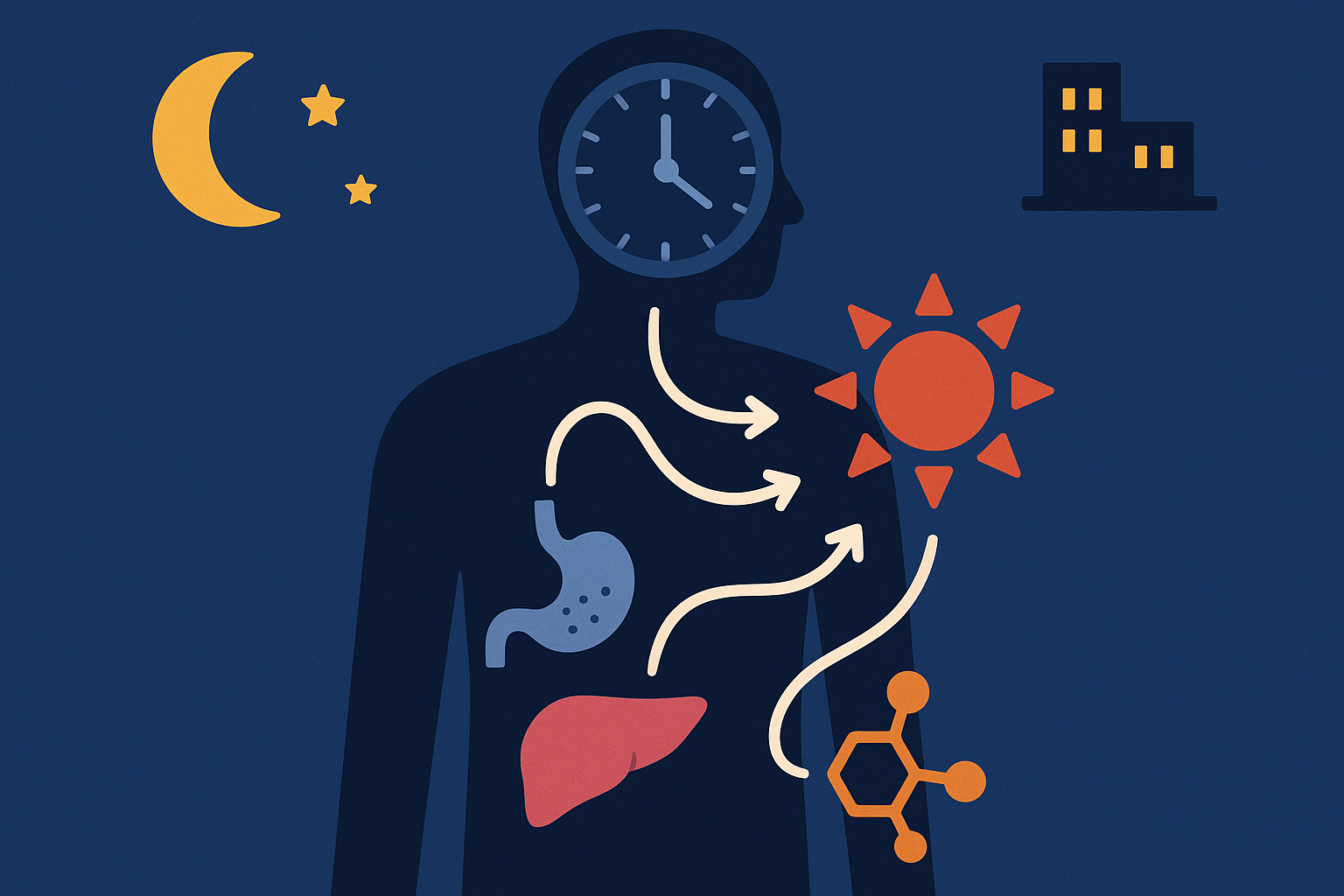
The Insulin Nightmare You Didn’t Know You Had
Here’s the thing nobody tells you: your body basically becomes diabetic at night. That pasta you’d normally handle fine at dinner? At 2 AM, it’s going to send your blood sugar on a roller coaster ride. I spent two years wondering why I’d crash so hard around 3 AM after eating what seemed like a totally normal dinner. Turns out, “normal” doesn’t exist when you’re working nights.
Just understanding your personal carb tolerance is essential for daytime eating, but finding your optimal carbohydrate timing becomes even more critical during night shifts.
Here’s a game-changer I wish someone had told me years ago: eat your real meal 2-3 hours before you clock in. This is when your body can actually handle food properly. Your body’s transitioning from evening wind-down to forced alertness, creating this weird window where you can actually set yourself up for success.
Here’s what I do now: moderate protein with complex carbs 2-3 hours before clocking in, healthy fats for sustained energy, and I completely avoid simple sugars that’ll tank my blood sugar halfway through the night. This approach forms the foundation of any effective 12 hour night shift meal plan.
| Time Period | Insulin Sensitivity | Recommended Foods | Foods to Avoid |
|---|---|---|---|
| Pre-shift (2-3 hours before) | Moderate-High | Complex carbs + lean protein | Simple sugars, refined carbs |
| Hours 1-4 | Moderate | Balanced meals with fiber | High-fat processed foods |
| Hours 5-8 | Low | Light proteins, vegetables | Heavy carbohydrate meals |
| Hours 9-12 | Very Low | Minimal eating, hydration focus | Any substantial meals |
Managing Your Mid-Shift Glucose Crash
Hours 6-8 of your night shift represent your body’s deepest valley of confusion. Everything feels harder during this time because your biology is screaming at you to sleep, not process food. We’ve all been there – staring at the vending machine at 4 AM, knowing the Snickers bar is a terrible idea but grabbing it anyway.
I plan my largest meal for hours 3-4 when my body can still somewhat handle food properly. Small protein-rich snacks keep my glucose steady during the rough patches, and I’ve learned to track my personal energy patterns because everyone’s metabolic valleys hit at slightly different times.
Sarah, a 12-hour night shift nurse, used to crash around 4 AM after eating a sandwich and chips at midnight. She switched to eating her main meal of grilled chicken, quinoa, and vegetables at 10 PM (hour 2 of her shift), with small protein-rich snacks during her body’s confused hours. Her energy remained stable throughout the shift, and she stopped experiencing the 4 AM crash that previously made patient care feel overwhelming.
Your Digestive System’s Confused Schedule
Ever notice how food just sits in your stomach like a rock during night shifts? Or how you can eat the same meal that energizes you during the day, but at night it makes you feel sluggish? Yeah, that’s your digestive system throwing a tantrum because it thinks it should be sleeping.
Night shift work scrambles your digestive enzyme production. Your body produces different enzymes at varying levels throughout 24 hours, and working nights throws this entire system into chaos.
Here’s what actually works: I distribute 20-30g of protein every 3-4 hours across my shift now. During those rough middle hours, I stick with easily digestible options – fish, eggs, or plant-based proteins that won’t tax my already confused digestive system.
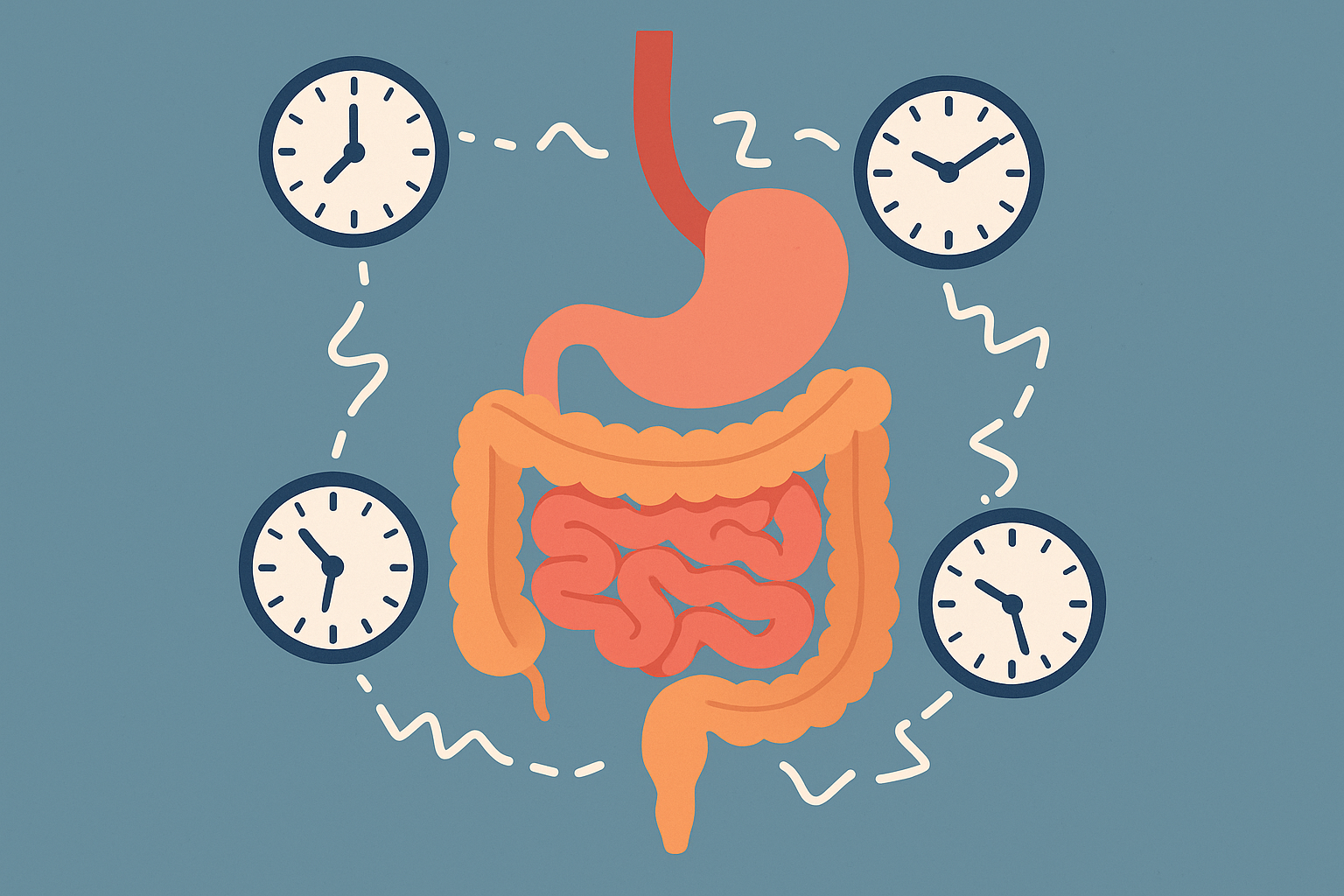
Fat Processing Gets Weird at Night
Your liver gets confused at night too. It’s like trying to do math when you’re half asleep – technically possible, but everything takes way more effort. I front-load healthy fats early in my shift when my liver function is more active, use MCT oil for quick energy without digestive stress, and avoid heavy, high-fat meals during hours 8-12 when my liver is naturally less efficient.
The Weight Loss Trap Most Night Workers Fall Into
First off, if you’ve gained weight since starting night shift, it’s not because you suddenly lost all self-control. Your body is literally working against you, sending hunger signals at weird times and making you crave exactly the wrong foods at 4 AM. Traditional weight loss advice fails night shift workers because it doesn’t account for the hormonal chaos created by circadian disruption.
Scientists found something pretty alarming – research from the University of South Australia published in “Diabetologia” by the Australian Nursing and Midwifery Journal found that participants who ate meals or snacks during night shifts had significantly worse glucose tolerance, with blood glucose levels “skyrocketing” compared to those who fasted during their shifts.
Your Hunger Hormones Are Basically Drunk
Your hunger hormones are basically drunk. They’re sending you “I’m starving!” messages when you just ate, and “meh, whatever” signals when you actually need fuel. Night shift work destroys your leptin-ghrelin balance – these hormones control hunger and satiety, but when you’re awake during traditional sleep hours, they send completely mixed signals.
Similar to how improving digestion requires understanding your body’s natural rhythms, managing night shift hunger requires working with disrupted hormonal patterns.
Here’s what actually works: I eat my largest meal during the first 4 hours of my shift when my body can still recognize fullness signals properly. On your days off, try not eating for 12-16 hours (I know, I know, but hear me out). It helps reset your confused hunger signals. Fiber-rich foods support natural satiety signals that get blunted by shift work. This timing strategy becomes central to any weight loss 12 hour night shift meal plan.
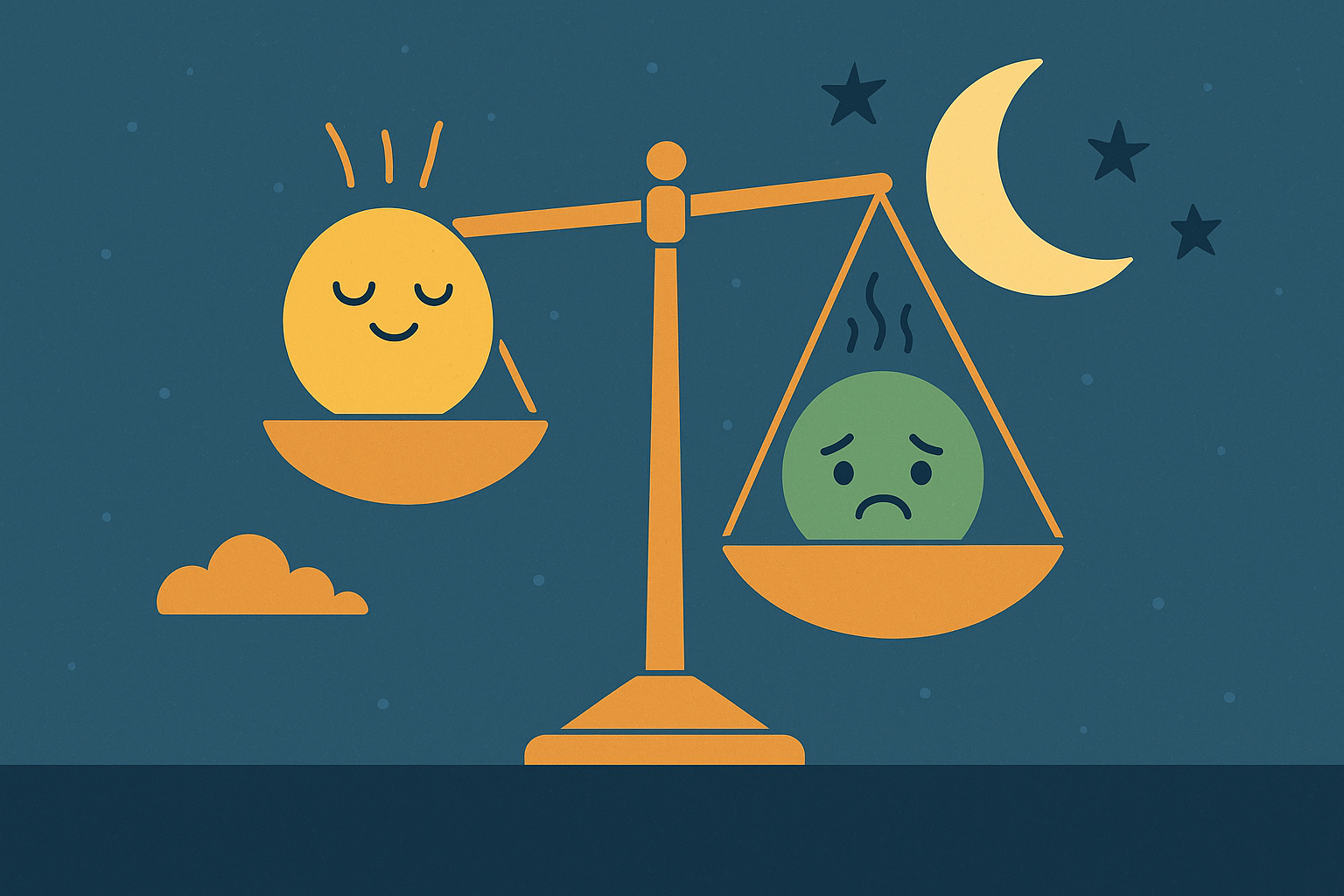
Cortisol Cravings Hit Different at 4 AM
Early morning hours spike your cortisol, creating intense cravings for high-calorie, high-sugar foods. It’s not willpower – it’s biochemistry working against you. You know that moment when you’d sell your soul for a donut at 4 AM? That’s cortisol talking.
Pre-portioned healthy snacks for hours 8-12 save me from vending machine disasters. Stress-fighting herbs like ashwagandha can help calm down that 4 AM cortisol spike that makes you want to eat everything in sight, and stress-reduction techniques during breaks prevent those cortisol spikes that trigger cravings.
Night Shift Craving Management Checklist:
- Pre-portion healthy snacks before shift starts
- Pack protein-rich options for 4-6 AM window
- Avoid caffeine after hour 6 of shift
- Practice 5-minute breathing exercises during breaks
- Keep stress-fighting teas readily available
- Remove vending machine money from wallet
Your Calorie-Burning System Is Broken
Your body’s calorie-burning ability follows patterns that night shift completely disrupts. Traditional exercise timing might not align with your energy levels, making weight management feel impossible. All those little movements throughout your shift – fidgeting, walking to the break room, even just standing instead of sitting – they add up to way more calories burned than you’d think.
Walking breaks every 2 hours during my shift boost metabolic rate. I use a standing desk when possible and incorporate brief bodyweight exercises during natural energy peaks. These small movements become crucial when your regular workout schedule doesn’t make sense anymore.
Mark, a security guard working 12-hour nights, gained 30 pounds in his first year despite eating the same calories as his day-shift colleagues. He discovered his body burned 200 fewer calories per shift due to disrupted metabolism. By incorporating 5-minute movement breaks every 2 hours and eating his largest meal during hours 1-4, he lost the weight over 8 months without changing his total caloric intake.
Timing Your Fuel: The Anti-Inflammatory Game Changer
You know that achy, run-down feeling you get after a few night shifts in a row? That’s inflammation talking. Your body is basically in a constant state of “what the heck is happening?” and inflammation is its way of dealing with the confusion. Night shift work creates chronic low-grade inflammation that affects everything from joint health to cognitive function, yet most meal plans ignore this completely.
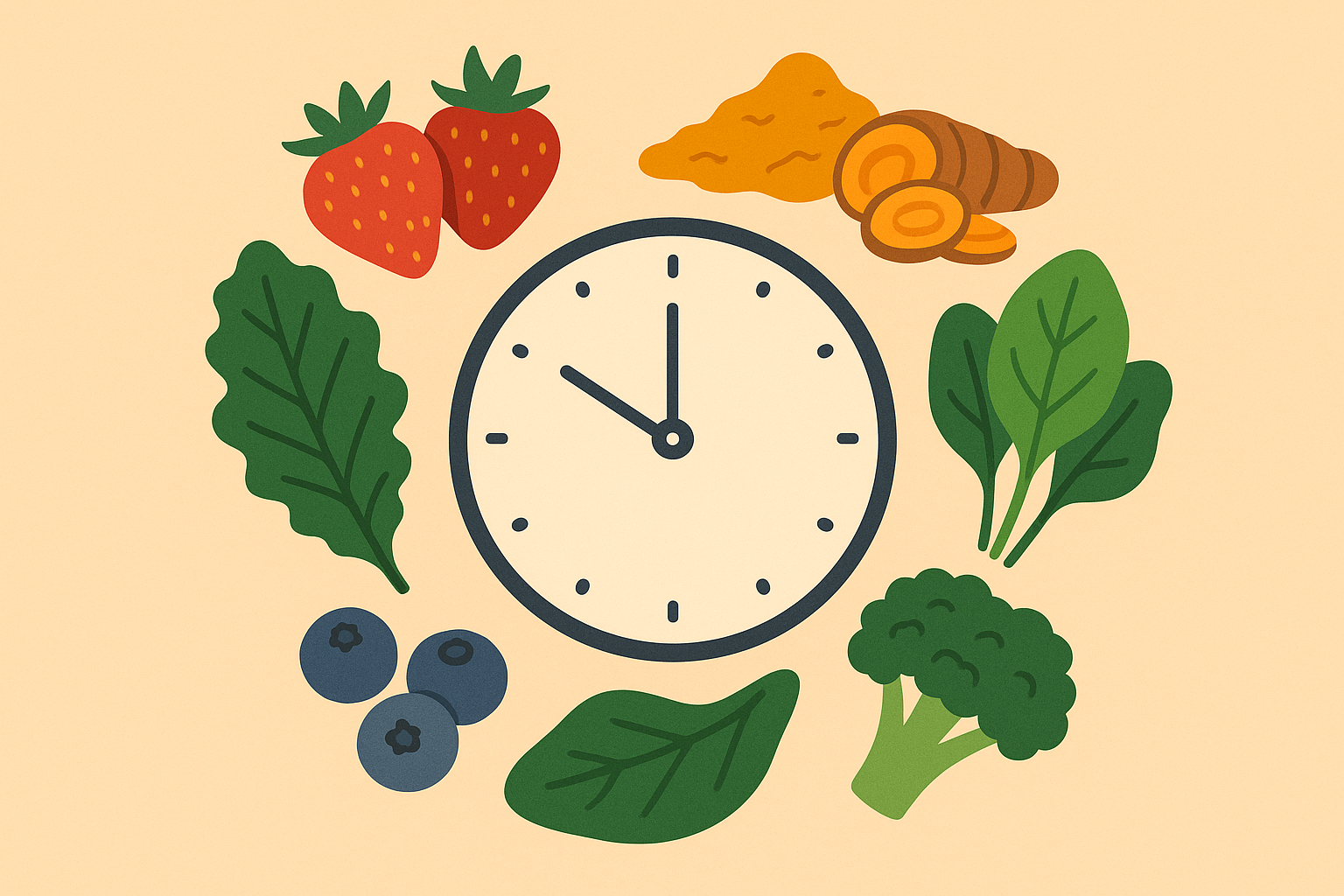
Fighting Inflammation While You Work
This low-grade inflammatory state affects joint health, cognitive function, and overall well-being in ways that go far beyond just feeling tired. If this sounds familiar, you’re not alone – it’s totally normal for night shift workers.
Just as sulforaphane from broccoli provides powerful immune support, timing anti-inflammatory foods strategically throughout your shift can combat the inflammatory stress of night work.
I load up on colorful foods before my shift starts – blueberries, spinach, whatever looks like it came from a rainbow. These foods are like little bodyguards protecting you from the stress of night work. Turmeric or ginger-based drinks during mid-shift combat inflammation peaks, and I end my shift with foods rich in quercetin to support recovery. This anti-inflammatory approach becomes essential for any comprehensive 12-hour night shift meal plan.
| Shift Hour | Inflammatory Risk | Target Nutrients | Food Examples |
|---|---|---|---|
| Pre-shift | Low | Polyphenols, Vitamin C | Blueberries, spinach, bell peppers |
| Hours 1-4 | Moderate | Omega-3s, Magnesium | Salmon, walnuts, dark chocolate |
| Hours 5-8 | High | Curcumin, Ginger | Turmeric tea, fresh ginger |
| Hours 9-12 | Peak | Quercetin, Green tea | Onions, apples, matcha |
| Post-shift | Recovery | Tart cherry, Melatonin precursors | Cherry juice, almonds |
Your Cellular Powerhouses Need Special Attention
Your cellular energy factories – mitochondria – take a beating during night shift work. They need targeted nutritional support to function optimally under this stress. Think of them as tiny engines that need premium fuel to keep running when everything else is working against them.
Foods rich in CoQ10 early in my shift when energy demands are highest make a noticeable difference. Magnesium-rich foods during wind-down support cellular recovery, and foods high in PQQ (fermented foods, green tea) support your cells in creating new energy factories.
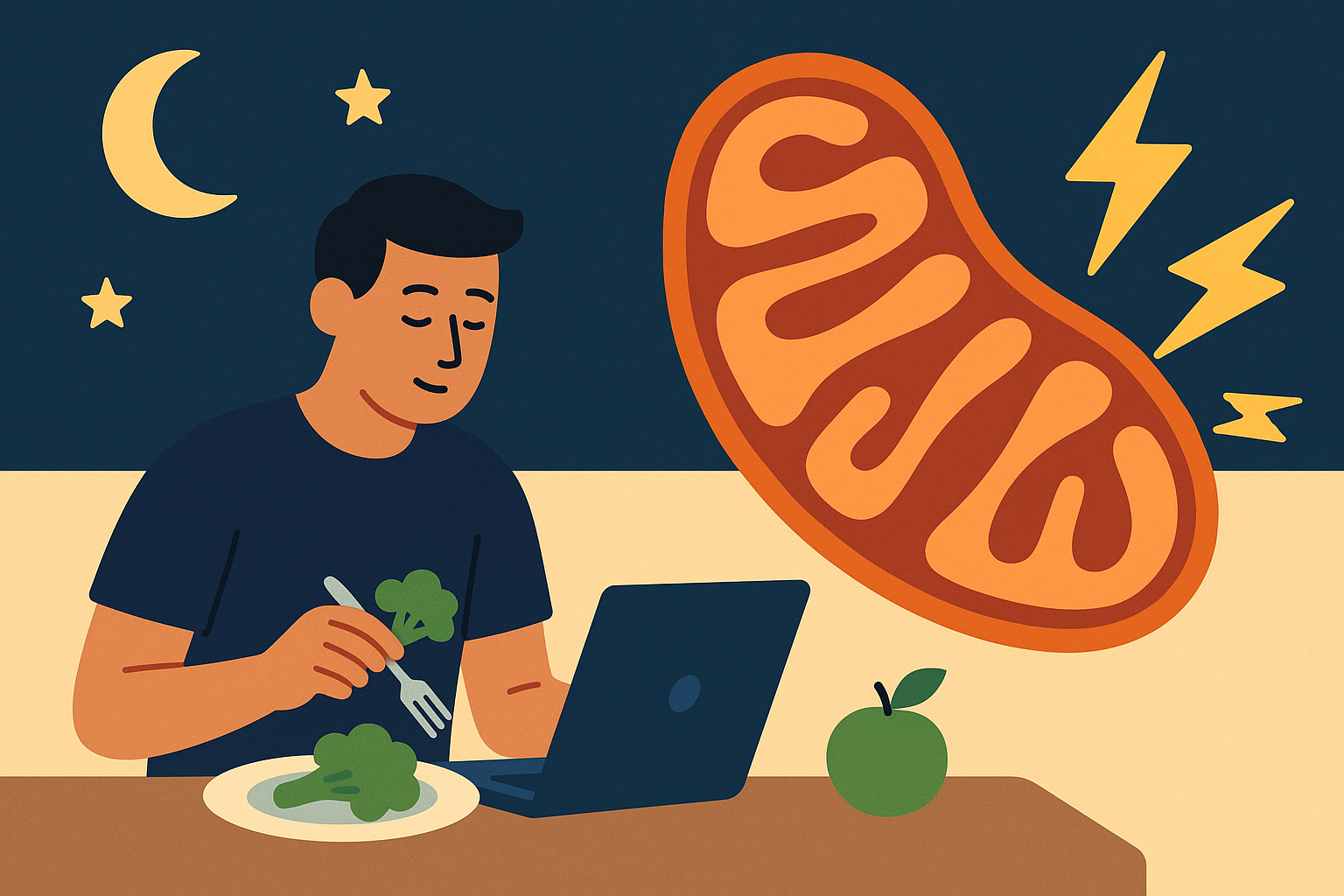
The Micronutrient Deficiency Nobody Talks About
Night shift workers face higher risks for specific vitamin and mineral deficiencies due to altered absorption patterns and increased metabolic demands. Limited sunlight exposure creates vitamin D challenges, while the stress of night work rapidly depletes B-vitamins. You’re not imagining it – your body actually needs more of certain nutrients when you’re working nights.
Similar to how certain daily supplements become essential for optimal health, night shift workers need targeted micronutrient support to counteract the unique stresses of their schedule.
I take vitamin D3 with my largest meal for better absorption and pair calcium-rich foods with vitamin K2 sources during my shift. Light therapy during work helps support vitamin D metabolism (and honestly helps with mood too).
Micronutrient Game Plan:
- Vitamin D3: 2000-4000 IU with largest meal
- B-Complex: Early shift with protein-rich meal
- Magnesium: 2-3 hours before intended sleep
- Omega-3: With pre-shift meal for absorption
- Zinc: Post-shift with recovery meal
B-Vitamins Disappear Faster Than You Think
The stress of night shift work burns through B-vitamins at an accelerated rate. These are crucial for energy metabolism and nervous system function – exactly what you need most during a 12-hour night shift. If you’ve noticed increasing brain fog or irritability during consecutive nights, this might be why.
B-vitamin rich foods at the beginning of each shift, stress-fighting herbs that support B-vitamin utilization, and monitoring for signs such as fatigue, mood changes, or cognitive fog help me stay ahead of deficiency.
Lisa, an ICU nurse, noticed increasing brain fog and irritability during her third consecutive night shift. Blood work revealed B12 and folate deficiencies despite taking a standard multivitamin. She switched to a high-potency B-complex taken with her pre-shift meal and added nutritional yeast to her snacks. Within three weeks, her mental clarity improved dramatically, and she could maintain focus throughout all three nights of her rotation.
Recovery Mode: The Missing Piece Everyone Ignores
Here’s what nobody talks about: what you eat AFTER your shift is just as important as what you eat during it. Most people focus all their energy on shift meals and then wonder why they can’t sleep or feel terrible on their days off.
I used to come home and either eat nothing (because I was too tired) or everything (because I was wired and hungry). Both approaches made me feel like garbage. Turns out, there’s a sweet spot. Post-shift nutrition is the most overlooked aspect of night shift meal planning, yet it determines how well your body adapts to circadian disruption and prepares for the next shift cycle.

Getting Your Brain Ready for Daytime Sleep
Most night shift meal plans focus only on shift nutrition while completely ignoring the critical recovery period. Your post-shift nutrition choices determine how well your body adapts and prepares for the next cycle. If you’ve ever felt completely wired after a shift but exhausted at the same time, you know what I’m talking about.
Just as understanding how to activate autophagy supports cellular repair, optimizing post-shift nutrition is crucial for recovery and adaptation to night work schedules.
Supporting natural melatonin production becomes essential when you need to sleep during daylight hours. Foods rich in tryptophan 2-3 hours before intended sleep time, magnesium and zinc to support melatonin production, and avoiding caffeine for at least 6 hours before sleep (even when you feel tired) make the difference between restful sleep and tossing and turning. This recovery phase completes any effective 12 hour night shift meal plan.
Post-Shift Recovery Game Plan:
- Tryptophan-rich foods 2-3 hours before sleep (turkey, eggs, pumpkin seeds)
- Magnesium supplement or magnesium-rich foods 1 hour before bed
- Tart cherry juice 30-60 minutes before intended sleep
- Avoid all caffeine 6+ hours before sleep time
- Light, easily digestible meal to prevent hunger without overloading digestion
Rebalancing Your Brain Chemistry
Night shift work disrupts the delicate balance of brain chemicals that regulate sleep, mood, and appetite. Recovery nutrition needs to address this chemical chaos. Have you noticed how your mood and appetite feel completely off after a series of night shifts? That’s your brain chemistry struggling to find its rhythm again.
Foods rich in tyrosine support dopamine production during recovery. GABA-promoting foods such as fermented vegetables support relaxation, and balanced omega-3 fatty acids support overall brain health while reducing inflammation.
Building a proper 12-hour night shift meal plan means accounting for this brain chemical disruption and planning recovery accordingly. You’re not crazy – your brain literally needs different support after working nights.
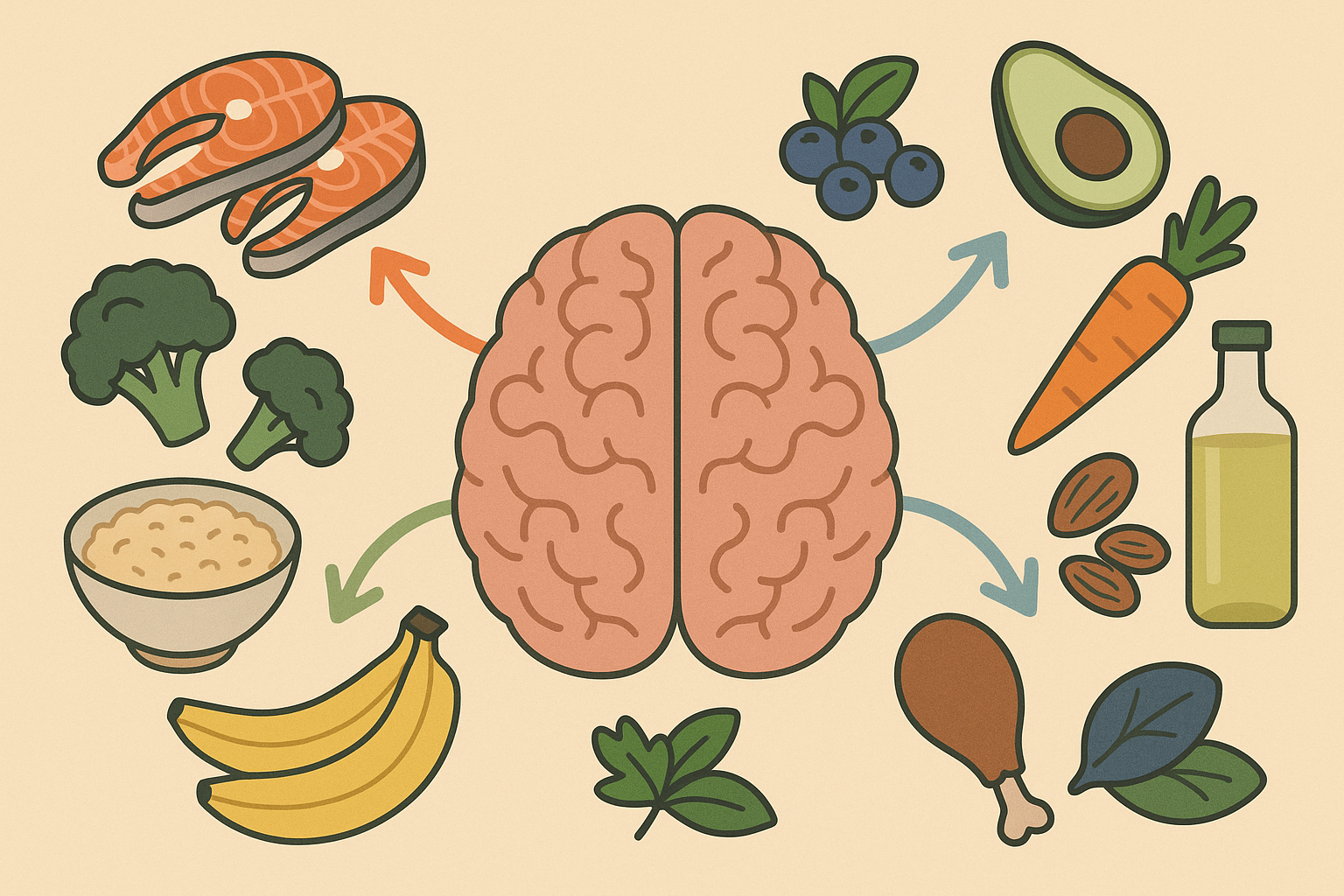
Final Thoughts
Look, I’m not going to lie – eating well on night shift takes some planning and experimentation. But once you stop fighting your biology and start working with it, everything gets so much easier. You’ll have more energy, feel less like a zombie, and actually enjoy your food again.
Night shift work fundamentally changes how your body processes food, manages weight, and recovers from stress. The conventional nutrition advice you’ll find everywhere else simply doesn’t account for the complex hormonal and metabolic disruptions that come with working against your circadian rhythm.
Understanding these biological realities isn’t just academic – it’s the difference between struggling through shifts feeling exhausted and sluggish versus having sustained energy and maintaining your health long-term. Your body isn’t broken; it’s just operating under conditions it wasn’t designed for.
The best part? You don’t have to be perfect. Start with one or two changes and build from there. Maybe it’s eating your biggest meal in the first 4 hours of your shift, or packing healthy snacks before you get to work. Whatever feels manageable right now is the right place to start.
If you’ve ever wondered why you gain weight on night shift even though you’re eating less, or why you feel like garbage no matter what you try – I get it. I’ve been there, and so have thousands of other night shift workers. You’re not alone in this, and you’re definitely not doing anything wrong.
Your future self will thank you – trust me on this one.

